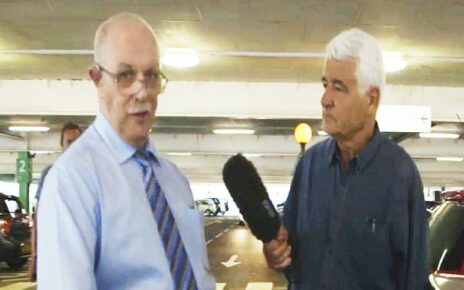Key points
- New taskforce will prepare a rapid response to a foot and mouth outbreak in Victoria.
- Emergency Management Commissioner Andrew Crisp and Agriculture Victoria chief executive Matt Lowe will co-chair the taskforce.
- The group will look at the broader impact of an outbreak, including the social, economic and environmental consequences.
Victoria’s emergency and agriculture chiefs are preparing a new rapid response to the threat of foot and mouth, seeking to mitigate the social and environmental fallout of an outbreak.
Emergency Management Commissioner Andrew Crisp and Agriculture Victoria chief executive Matt Lowe will co-chair the new emergency animal disease taskforce, which will begin advising the state government next week.
Officers spray disinfectant in a shed at a Yogyakarta cattle farm where foot and mouth has previously been detected.Credit:Getty Images
The committee will step up preparations for an outbreak and consider how it would spread beyond the agriculture sector and affect other industries, including tourism.
The rapid spread of the disease in Indonesia has alarmed local authorities and farmers, who fear the disease might reach Australia.
A foot and mouth outbreak resulted in the destruction of 6 million pigs, sheep and cows in Britain in 2001, devastating the agriculture sector.
The British outbreak also caused widespread social and economic damage, with travel bans implemented in areas popular with tourists.
Local farmers fear a foot and mouth disease outbreak would result in the destruction of millions of animals. Credit:Jason South
The Victorian government said the new response plan would focus on bolstering Agriculture Victoria’s workforce to manage the widespread threats posed by a foot and mouth outbreak. The taskforce will take advice from Victoria’s chief veterinary officer, Graeme Cooke.
The group’s establishment came after authorities moved to allay fears this week that the Melbourne Royal Show posed a biosecurity risk.
Lowe said foot and mouth disease was not yet in Australia and robust measures were needed to protect the border.
“However, it is necessary to have plans in place which continue to be worked on in case they are ever needed,” he said.
Livestock in Kuta, Bali, during the foot and mouth outbreak.Credit:Amilia Rosa
Indonesian authorities reported no cases of foot and mouth in Bali this week, but experts warned the island, which is popular with Australian travellers, was far from free of the virus.
Sanitation foot mats were rolled out at Australian airports this week for passengers disembarking from Indonesia.
Foot and mouth disease is a highly contagious virus that affects cloven-hoofed animals, including cattle, sheep, goats, camels, deer and pigs. It does not affect humans.
Symptoms usually begin with a high fever, followed by painful blisters inside the mouth and on snouts, teats and feet that can take up to 10 days to heal.
The disease can be spread on shoes and clothes. It can survive in people’s noses for 24 hours.
Fragments of the virus have been detected on pork products in Melbourne this month, although they were not considered a transmission risk.
This week the federal government confirmed all parcels mailed to Australia from Indonesia and China would be screened for foot and mouth disease using X-ray machines and sniffer dogs.
The Morning Edition newsletter is our guide to the day’s most important and interesting stories, analysis and insights. Sign up here.
Most Viewed in National
From our partners
Source: Read Full Article




